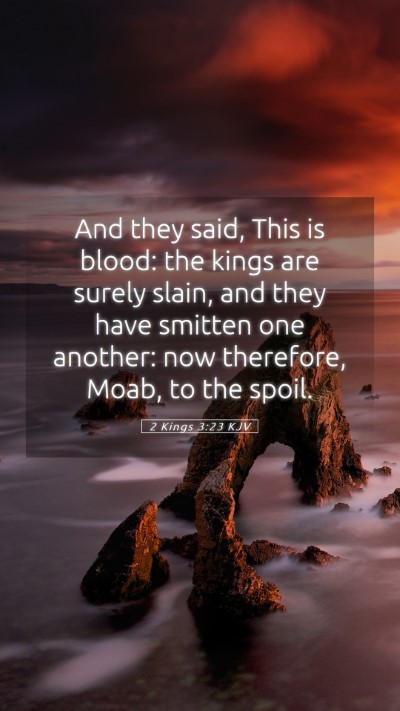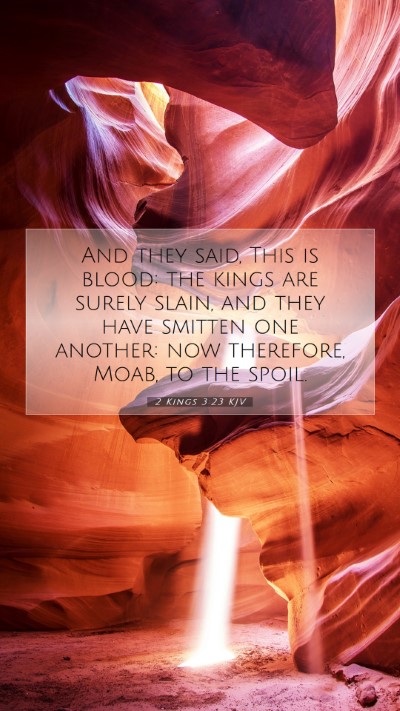Understanding 2 Kings 3:23: A Comprehensive Commentary
The verse 2 Kings 3:23 reads:
"And they said, This is blood: the kings are surely slain, and they have smitten one another: now therefore, Moab, to the spoil."
Background and Context
This verse is set against the backdrop of a military campaign against Moab. The kings of Israel, Judah, and Edom had joined forces to confront Moabite rebellion. Prior to this moment, the armies had faced a severe scarcity of water, and prophetic intervention had assured them of victory.
Historical Context
The historical context is crucial for understanding this narrative. The alliance between the three kings, united against a common enemy, illustrates the political struggles and alliances of the ancient Near East. Moab had previously been subdued by Israel under King David, and the subsequent rebellion of Mesha, king of Moab, led to this coalition.
Bible Verse Meanings: Insights from Public Domain Commentaries
Combining insights from Matthew Henry, Albert Barnes, and Adam Clarke, we can delve deeper into the meaning of this verse.
Matthew Henry's Commentary
- The Perception of the Kings: Matthew Henry points out that the kings, upon seeing the red hue of the water, mistakenly took it to be blood. This reflects a common human tendency to jump to conclusions based on appearances.
- The Irony of the Situation: The irony is profound; their enemy's defeat was misinterpreted as their own advantage. Henry emphasizes that God can use confusion among the enemies to bring victory to His people.
- Encouragement in Desperation: The prophetic word provided previously gave them confidence. Henry notes that even when circumstances seem dire, faith in God’s promise can lead to unexpected outcomes.
Albert Barnes' Analysis
- Misinterpretation and Its Implications: Barnes elaborates on the idea that the kings believed they could take advantage of what they perceived as a civil war among the Moabites. This misinterpretation highlights the importance of discernment in understanding God's moves.
- The Role of God in Warfare: Barnes reflects on how divine involvement in this context raises questions about human perceptions of conflict and how they often miss the spiritual realities behind physical battles.
- The Call to Action: He emphasizes that the interpretation led to a call to action. Seeing an opportunity misinterpreted should not discourage believers; rather, it is a reminder to seek prophetic guidance.
Adam Clarke's Commentary
- Symbolism of Blood: Clarke notes the symbolic significance of blood in this context; it represents judgment and devastation. However, the reality differed significantly from their assumption, revealing divine sovereignty over the situation.
- The Nature of Human Understanding: Clarke warns against relying solely on human understanding when interpreting events. The misjudgment of the kings serves as a critique of human fallibility.
- The Prophetic Insight: He highlights that prophetic counsel is critical in guiding toward the truth, suggesting that without such insight, erroneous conclusions can lead to disastrous consequences.
Application of 2 Kings 3:23
This verse holds significant lessons for personal application:
- Discernment: Just as the kings misinterpreted the blood, believers today must practice discernment in their assessments of situations. It’s a reminder to seek God’s wisdom before acting.
- Faith in God’s Promises: This story emphasizes the importance of holding firmly to God's promises even in dire circumstances. The kings had been assured of victory, yet their initial interpretation led them astray.
- Expecting the Unexpected: The unexpected twist of events encourages believers to remain open to God's leading and surprising interventions in their lives.
Related Bible Cross References
- 1 Kings 20:33-34: This passage discusses the mistaken judgments of Ahab concerning Ben-Hadad, illustrating similar themes of misinterpretation.
- 2 Kings 1:16: The reliance on prophetic revelation as a means of understanding God’s plans.
- 1 Samuel 14:24-30: Another example of misjudgment in warfare and the consequences that follow.
Conclusion
In conclusion, 2 Kings 3:23 serves as a profound reminder of the complexities of understanding God's will and the importance of relying on divine insight in our decision-making processes. The observations drawn from renowned commentators enrich our understanding of this scripture and facilitate deeper Bible study. For anyone looking to comprehend the meanings, interpretations, and applications of Bible verses, utilizing these insights can greatly enhance one's scriptural knowledge and approach to study.


